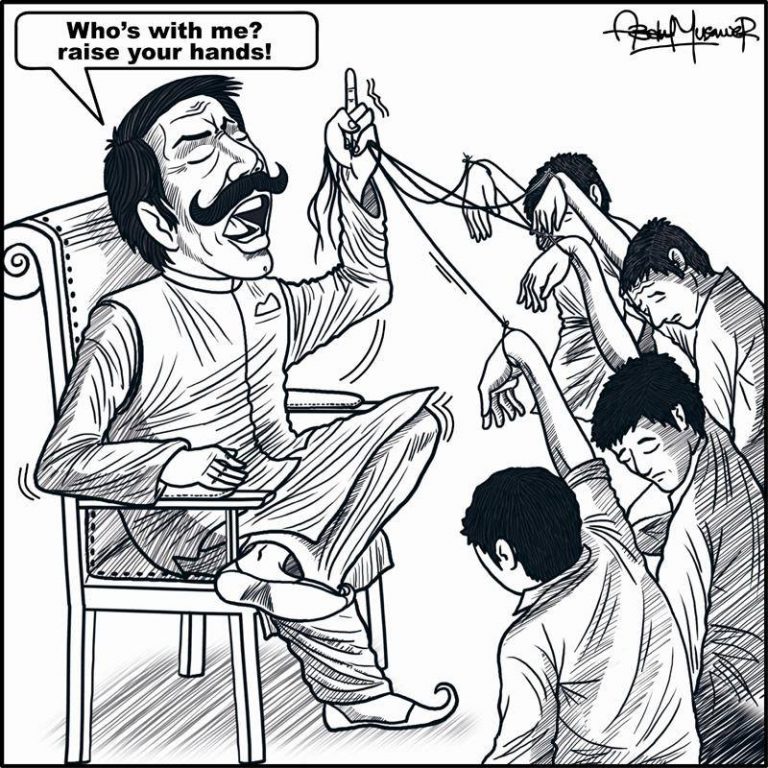
There is a very strong influence of local elites in all parts of Sindh. They have direct influence on lives of common people. They also enjoy control over government institutions such as the police, courts and district administrations.
Dr. Sadiq Bhanbhro
It was when feudalism in Pakistan used to be the talk of the town and a political scientist and author Eqbal Ahmad had to comment that feudalism serves as a whipping boy of Pakistani intelligentsia.
Earlier this month, the brutal murder of Nazim Jokhio and Fahmida Siyal has opened up a heated debate on social media, particularly on Twitter and Facebook, concerning the feudal system and its unrestrained power in Sindh. Hashtag trends kicked off against tribal chiefs and waderas because of the alleged involvement of PPP lawmakers and tribal chieftains in these murders.
This time, the discourse on feudal lords and their power is distinctive because it is led by social media activists, who are relatively young, educated and mostly affiliated to civil society and human rights organizations instead of academia or intellectuals. The activists’ faith in PPP shook when PPP’s social media workers confronted them vehemently. PPP Chairman Bilawal Bhutto Zardari did not pay any attention to their demand to expel the accused PPP leaders or suspend their membership until an impartial investigation. The PPP Chairman may have his own reasons for not meeting the activists’ demands. Still, it was obvious that there is no precedent in Pakistan where political parties act against their leaders, especially the winning horses.
Academically, feudalism may be an archaic subject, but practically for many, it is of great concern because it has implications for their everyday lives. It is part and parcel of the Pakistani elite’s thinking. Still, there is no serious study on its nature and functions in Pakistan. That said, PPP leader Dr. Nafisa Shah has discussed tribal, feudal structures and their power concerning tribal clashes and Karo-Kari killings in Upper Sindh in her book ‘Honor Unmasked’. Dr. Shah’s book can be a source of soul searching for PPP.
During my PhD research on the political economy of honor and honor killings in the same region, I learnt that there is no medieval feudalism in Sindh. For example, the feudal lords are locally known as sardars, wadera, raeis, bhotar and pir, who do not maintain private armies or collect taxes as was the case in medieval times. However, a local version of the feudal system exists as a colonial legacy in which rural elites have large landholdings, many tenants or farm laborers, and common people from their tribes, clan and kinship groups support and vote for them in return for social, economic, and personal protection. In turn, these elites cash this vote base to get a party ticket for elections and further strengthen their power.
Consequently, there is a very strong influence of local elites in all parts of Sindh, particularly Upper Sindh, and these have a direct influence on all aspects of the lives of common people. They also enjoy control over government institutions such as the police, courts, district administrations, education, and health. Most of them are affiliated with political parties and have direct or indirect connections with powerful state institutions. Thus, they enjoy unrestrained power and patronize criminal activities with impunity, such as murders like Nazim Jokhio and Fahmida Siyal, tribal feuds and Karo-Kari. For instance, a jirga system is a powerful tool used by sardars and waders to demonstrate their power and control. A sardar or a wadero usually heads a jirga, and both warring parties unanimously agree upon a decision made by them. Most disputes, including tribal feuds, Karo-Kari, theft, land, or property, are settled through jirgas instead of courts. It was reported that some PPP leaders used the tactic of labelling Fahmida Siyal’s murder as a case of the tribal feud to push the case to be settled through a jirga.
Local elites enjoy power in all sorts of governments, whether it is democracy or dictatorship; one way or another, they are part of the government, though more permeable in some governments than others. They are members of legislative assemblies, ministers, and government advisors. It is in their interest to keep the people backwards, uneducated, and economically and politically dependent, to rule them through official government machinery and private crooks.
Due to the massive power base of a sardar or wadero, no one dares raise their voice against them for fear of being socially excluded, economically crippled or facing terror. This could be the case for Nazim Jokhio’s brother to remove PPP MNA’s name from this brother’s murder case FIR. The social media activists striving for justice for Nizam Jokhio are condemning and maligning his brother that he has got money from his brother’s murders. However, they forget that surviving on the ground and tweeting online are two different realities, especially in a society where the state institutions don’t do their job and work under the influence of the same people behind the crimes.
These powerful tribal chieftains and feudal lords do not exercise their power independently. Still, they operate under a system that supports their concerned political parties and state and government institutions. The state institutions should assert their independence as the public can trust them. The PPP leadership needs to pay attention to this issue as the people of Sindh need the rule of law, not the rule of feudal lords. Sindh government needs to make efforts to depoliticize the state and government institutions, particularly the police.
_______________________
About the Author
Dr. Sadiq Bhanbhro (PhD) is a Senior Research Fellow at Sheffield Hallam University. He published more than 20 peer-reviewed research papers in high-quality international journals. He writes research-based blogs in English newspapers of Pakistan and UK.